| |
"They were outside the range of God, not only of respectability, of love, but of God too." |
| |
William Faulkner on the lead characters of Pylon,
adapted by George Zuckerman as The Tarnished Angels
|
| |
The film is nothing but a collection of defeats. Dorothy loves Robert, Robert loves flying. Jiggs also loves Robert, or maybe Dorothy and Robert? Rock doesn't love Dorothy, and Dorothy doesn't love Rock. At most it's a lie, even if the film sometimes makes the whole thing believable. |
| |
Rainer Werner Fassbinder on Tarnished Angels |
As someone who claims to be largely averse to cinematic melodrama and tales of romance, I find myself having to do an about-face when it comes to Douglas Sirk, a German émigré who really made his mark in the Hollywood studio system. Sirk, you see, made great romantic melodramas and elevated this much maligned subgenre to the level of high art. During the 1950s he made what are now widely regarded as four of the finest of all romantic melodramas in Magnificent Obsession, All That Heaven Allows, Written on the Wind and Imitation of Life. The first three also helped make an international star of up-and-coming actor Rock Hudson, with whom Sirk made a total of nine films during the course of the decade. Although not highly regarded by the critical establishment of the time, Sirk's work was celebrated by two young writers in Cahiers du Cinéma named François Truffaut and Jean-Luc Godard and had a considerable impact on future filmmakers worldwide, including Rainer Werner Fassbinder, Pedro Almodóvar, Martin Scorsese, John Waters, Quentin Tarantino, Wong Kar-wai and Lars von Trier. Word has it that even David Lynch is a big fan.
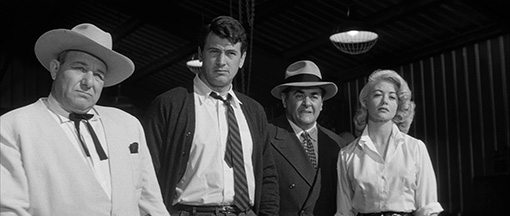
Adapted by George Zuckerman from the William Faulkner novel Pylon, The Tarnished Angels was Sirk's final collaboration with Hudson and is curiously one of the least widely discussed. Here Hudson plays run-down journalist Burke Devlin, who stumbles onto a possible human interest story when he meets ace WW1 pilot Roger Shumann (played by a typically hard-nosed Robert Stack), who now ekes out a living racing planes around pylons at a carnival air show, assisted by his devoted wife LaVerne (Dorothy Malone) and faithful mechanic Jiggs (Jack Carson). On discovering that they don't have a bed for the night, Burke offers them and Roger's young son Jack the use of his apartment, but soon finds himself attracted to the long-suffering LaVerne. He's not the only one. For years Jiggs has been carrying a torch for LaVerne that he would never act upon, though he makes no attempt to silence the rumours being spread by other mechanics, who tease the furious Jack about whether his real father is Roger or Jiggs.
Aesthetically The Tarnished Angels trades in Sirk's celebrated use of colour for a striking and sometimes expressionistic monochrome look, appropriate for what plays at times like a head-on collision between romantic melodrama and Germanic film noir. This is echoed in the cloud of impending doom that hangs over the proceedings from an early stage, one as fashioned by tradition as by character and visual style. In movies at least, stunt flyers are on a par with those who work in bomb disposal or on the circus trapeze, death-defying professions whose practitioners are so often written as future tragedies just waiting to happen. This is emphasised in the film's first race, when a mid-air collision causes a spectacular crash that results in the death of one of the pilots. And things don't really get any better for the leads, as an unbroken series of disappointments and defeats see escape routes to happiness repeatedly closed off.
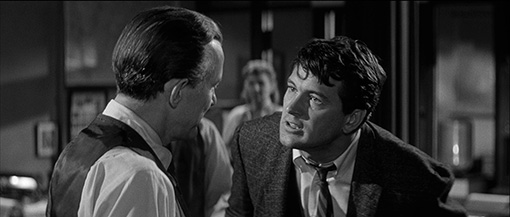
Sirk directs these personal dramas with his customary aplomb, allowing a strong quartet of actors (three of whom previously starred in Written on the Wind) to run with their emotions without ever overplaying them. Indeed, so restrained is Hudson in the early scenes that I actually had trouble believing he was ever the paper's star reporter, seemingly too timid to ask the difficult questions or grab onto a story with a terrier-like grip. However, the reason for his current demeanour is revealed when he returns to the newsroom and his editor takes a suspicious sniff of his coffee, a subtle but telling reference to his career-stalling alcoholism, confirmed in many of the scenes that follow, where Burke is often seen with a drink in his hand or reaching for another. And any doubts about whether Hudson could play the firebrand reporter of film tradition are soundly dispelled in his climactic return to the office from which he has since been fired to reveal the human story behind the paper's dutiful headline. As he enters the room, his drunkenness is laughed at by reporters who have clearly seen all this before, but the speech he delivers is so spellbinding and passionate that he soon has the whole room (and us) enraptured.
Equally impressive is Sirk's technical handling, with his positioning of actors within the scope frame and fluid camera movements having storytelling purpose beyond the aesthetic appeal of the shots themselves, while the cross cutting between Roger and Jack at the climax of the second race – Roger in a real plane, Jack on an airplane carnival ride, both travelling in anticlockwise circles – is beautifully handled and brought to a genuinely heart-rending conclusion. Even Sirk's signature use of match-cuts is loaded with meaning here, linking Burke's sexual desire to LaVerne's marital frustration through nothing more than a raised liquor glass. Perhaps most surprising, given Sirk's reputation as a master of melodrama, is how thrillingly the two race sequences are staged. The back projection may be all the more visible in HD, but the model work is seamlessly matched to some genuinely exciting real-world stunt flying, and the first race crash concludes like no other I've ever seen on screen.
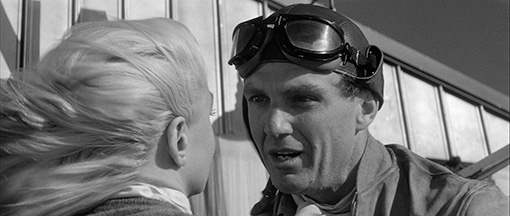
The world of The Tarnished Angels is one in which men and women alike seem to suffer in a state of emotional isolation, clinging to false hope but painfully aware that life's best opportunities have passed them by. The tragedy for LaVerne is that she has actually married the man she always wanted, but is unable to compete with a mistress that has no physical form, her devotion and sex appeal no match for the addictive thrill that Roger derives from winning races and dancing with death. This is most starkly illustrated when Roger effectively asks her to prostitute herself to rival Matt Ord to secure the use of a plane that will enable him to compete after his own machine is damaged. Yet LaVerne's alternatives – an alcoholic reporter, a love-sick mechanic and a lustful businessman – all fall short of the dream-chased ideal that, even at this late stage, Roger represents.
All of which makes the question of why The Tarnished Angels has not attracted the same level of critical appreciation as its more colourful companions all the more vexing. Was this portrait of four people embroiled in a narrative comprised of personal disappointments considered too pessimistic or its central conceit too trashy? It's hard to be sure. It certainly took a critical pasting on its release, at least on home turf, with Bosley Crowther in the New York Times describing it as a film that is "badly, cheaply written by George Zuckerman and is abominably played by a hand-picked cast," a comment that now seems patently absurd. On the very disc, the redoubtable Bill Krohn claims this was William Faulkner's own favourite film adaptation of his written work, and I'm not about to argue with the man. Indeed, for it's boldly downbeat narrative, its complex and morally troubled characters, its rich sub-structure, its wonderfully offbeat detail and its technical mastery, I'm fully prepared to champion The Tarnished Angels as one of Sirk's finest and most rewarding films, and I can think of no higher praise than that.
I tend to wear shorts and sandals all summer, which is probably just as well, as otherwise I have no doubt at all that the HD transfer here of The Tarnished Angels would have blown my socks off. Sure, Eureka's Masters of Cinema label has delivered some excellent transfers over the years, but this one really is a standard-setter. The tonal range is excellent, the black levels gorgeous and the sharpness and level of detail are genuinely eye-popping. If you get your hands on it (and you really should) then check out the high angle wide shot of the huge crowd gathered for Mardi Gras a few seconds in to chapter 3 – not only can you make out every one of the few hundred people in the foreground of the shot, but also some of the specifics of their clothing. Film grain is visible, though you'll need to lean forward to really see it, and there's not a dust spot or trace of damage to be seen. A glorious job.
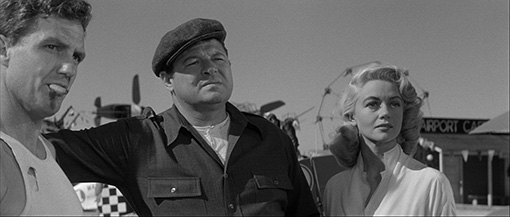
The linear PCM mono 2.0 soundtrack has some expected range restrictions, but the dialogue and especially the sound effects are clearly and cleanly reproduced. You'll have to really crank the volume up to hear even a trace of background hiss, and even then you'll only catch it at all if everything else is silent. A first-rate job of a film of this vintage.
Music and Effects Track
Basically the film but with all the dialogue silenced. I've never been too sure of the value of these tracks, unless you're in the process of learning to mix sound. That said, it does prove an intermittently interesting listen and does focus your attention on how music is used to shape mood and emotions. It also confirms how clear the sound effects are for a film of its age.
Commentary
As someone who approaches so-named 'expert' commentaries with a degree of trepidation but who has been pleasantly surprised and even enthralled by those on previous Masters of Cinema releases, I quickly warmed to Australian film and arts critic Adrian Martin's gentle delivery and detailed analysis of the film, Sirk's career and specific scenes. There's some really interesting stuff here, particularly the background information on the shoot and the intriguing Fassbinder claim that the lead characters are essentially corpses and that the narrative is constructed of a series of defeats. However, Martin's unbridled love of the film does seem to cloud his judgement at times, prompting some lofty claims about the daring of smartly executed but hardly revolutionary lighting and camera moves, and even the blocking of actors. Still, it is rather amusing to hear him refer to the oft-revered Pauline Kael dismissively as "a film critic I have no time for" and her writing on the film as "typical Kael nonsense."
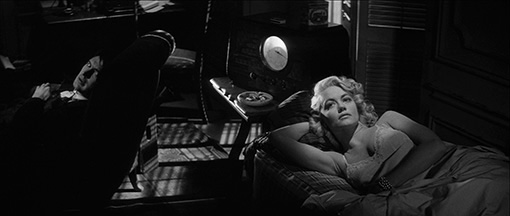
Talk About the Business: William Schallert (19:00)
Prolific character actor William Schallert, who had small roles in Written on the Wind and The Tarnished Angels, recalls his entry into the film business, his early work with Max Ophuls and John Huston, and how he came to work with Sirk, with particular focus on The Tarnished Angels. A really interesting and engaging piece that seems to just fly by (no pun intended).
Infernal Circle: Bill Krohn (29:42)
A typically enjoyable and informative contribution from Masters of Cinema regular and Cahiers du cinéma writer Bill Krohn, who provides some useful background on producer Albert Zugsmith and offers a detailed reading of the film and its qualities, one that pleasingly differs from others in this package. Referring to the film at one point as a wonderful wedding of art and trash, he selects Jack Carson's performance as the best in the film and points out that the title theme music sounds more like that of a 50s science fiction film (he's absolutely right and I can't believe I didn't notice this before). There's some terrific stuff here and despite running only a third of the film's length, I think got more from this than I did from the commentary.
Acting with Douglas Sirk (23:25)
Oh now we're really talking. A featurette comprised of archive interview snippets with director Douglas Sirk, producer Albert Zugsmith and actors Rock Hudson, Dorothy Malone and Robert Stack, all taken from a 1980 German television documentary Douglas Sirk: Über Stars, plus a recent interview with filmmaker and Sirk fan Alison Anders. The focus is on Sirk and his directing style and the actors' work on Written on the Wind and The Tarnished Angels. Rock Hudson's story about how his initial interpretation of Burke was vetoed by the producers when they clapped eyes on the dailies is particularly interesting, as is the devoutly Catholic Dorothy Malone's revelation that she really enjoyed that final on-screen kiss with Robert Stack. It's priceless stuff and includes plenty of material not found elsewhere on this release, and stick with the end credits for Albert Zugsmith's final plea to work with Sirk again.
Theatrical Trailer (2:37)
A well handled trailer that really pushes the film as a controversial love triangle drama – there's not a whisper of air action included here, save for the first part of LaVerne's stunt parachute jump.
Booklet
A typically excellent companion to the film, the accompanying booklet includes the 1958 Cahiers du cinéma review by Luc Mollet, an intriguing on-set report by Tom Henebry from the beach where the races were filmed (Henebry's real interest is clearly the planes, with Sirk referred to only as "the director"), useful snippets of interviews with Sirk and Faulkner, an appreciation of the film by Rainer Werner Fassbinder, a pertinent extract from Red Gallagher's White Melodrama, production stills and credits for the film, and the original poster. Oh, and whatever you do, don't look at the back cover until after watching the film if you're looking to avoid a major plot spoiler.
It took me a while to really get into The Tarnished Angels on my first viewing but when I did I became completely hooked, and second time around I was captivated by every carefully calculated frame. A hugely undervalued work by a major director and perfect material for this immaculate Masters of Cinema Blu-ray release, whose pristine transfer is backed up by a generally superb set of extras. Love it to bits. Highly recommended.
|